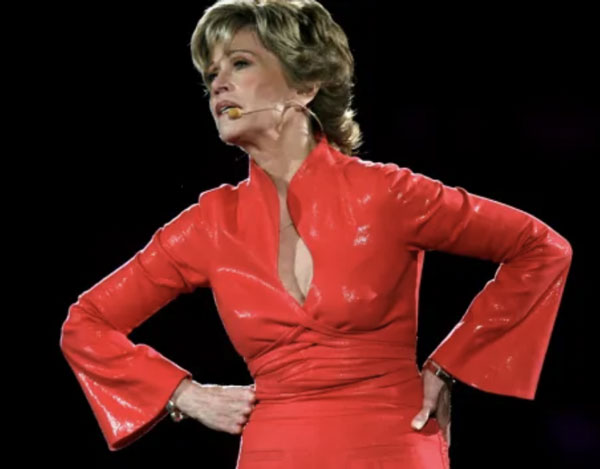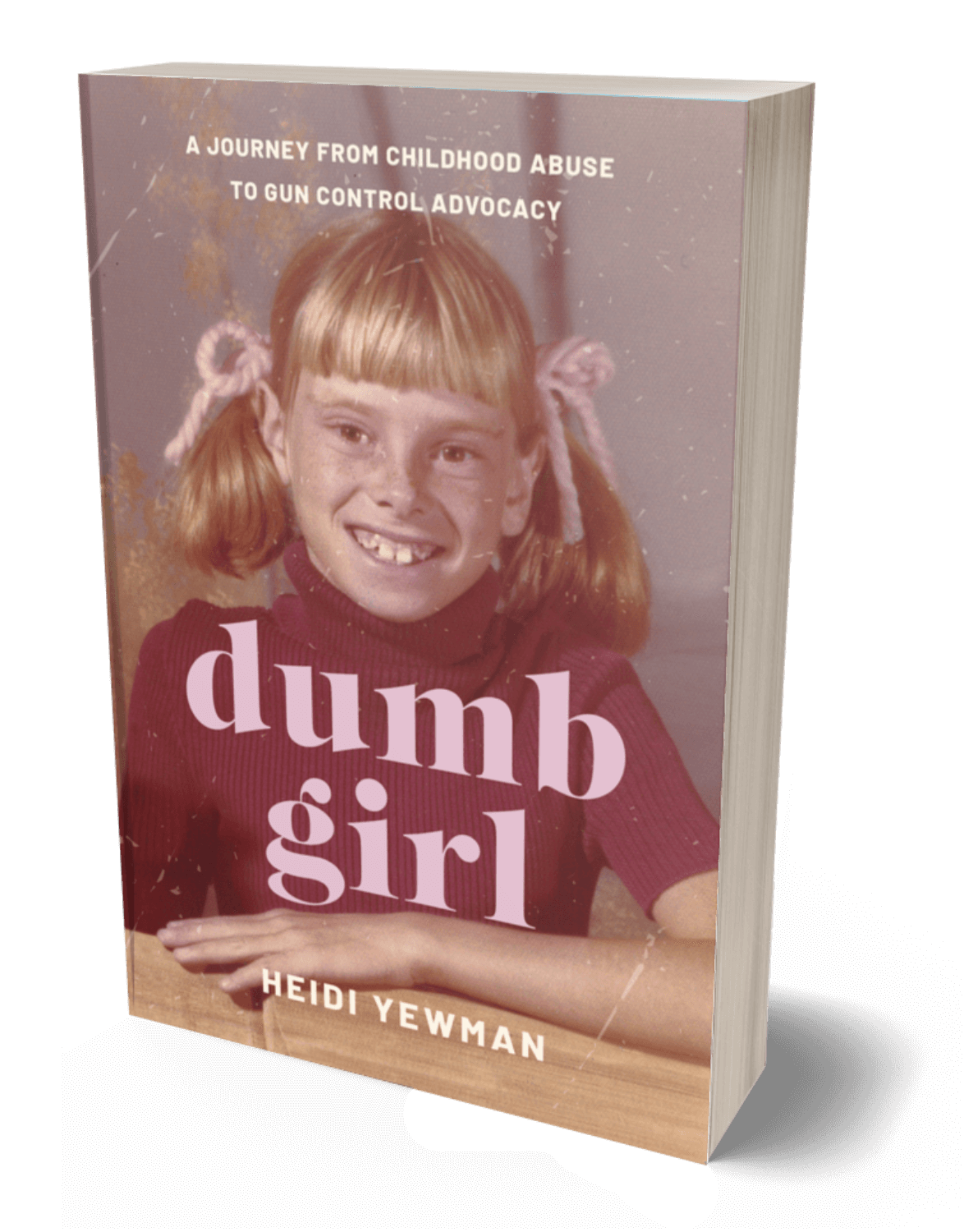Jane Fonda stood on a warmly lit stage twenty feet from me. Behind her was a massive garish red-purple-pink-yellow-painted image of what was either the inside layers of a flower or a vagina.
She was part of an ensemble of sixteen Hollywood celebrities performing a rendition of Eve Ensler’s play The Vagina Monologues in Santa Monica, California, and she was talking about her vagina. Her ability to talk about such a personal thing as her vagina was astonishing to me. And really, everything about her was larger than life: She was eighty years old but looked forty; her skin had a youthful glow; her dancer’s posture exuded confidence; and her made-up blue eyes were expressive and intense. Her voice was captivating and almost sensual, kind of raspy and full of gravitas.
“Think about it,” she said. “It’s moist, it’s a wetland, it’s a place where people come for fun. And when things go south, forget about it.”
I hung on her every word.
It was February 2018, the height of the #MeToo movement where women across the world were collectively refusing to hold the shame of being sexually harassed and abused. The event was one of many that Hollywood celebrities used to break the silence by sharing their own experiences of rape, harassment, and abuse. The play was both a celebration of women’s sexuality and an examination of violence against women, produced by Deborah Kagan.
Two days earlier my husband, Dave, and I had had lunch with my friend Jeremy Kagan, who happened to be directing the performance. He’d deemed us “special guests.”
Tonight, once the lobby doors had opened to the five-hundred-seat theater, I’d made a beeline to the second row of seats, which were cordoned off with yellow tape that said “Reserved for special guests.” As we ducked under the yellow tape and took our seats, I could feel the anxious excitement of the mostly female patrons who poured into the auditorium. Some greeted friends with enthusiastic hugs while others scanned the room for celebrities who might be attending. Not being from LA, I got the feeling that “celebrity scanning” was a tradition, and I was not immune. Laverne Cox, a star of Orange Is the New Black, sat two rows behind us, and I kept sneaking peeks at her.
As the lights dimmed, the buzz of voices quickly softened as renowned personalities, Oscar-winning actors, and comedians—Rosario Dawson, Marisa Tomei, Wanda Sykes, Wendie Malick, and Cheri Oteri, among others—walked onto the stage to perform their monologue.
I sat motionless as I absorbed the sometimes emotional, sometimes funny, and profoundly gripping monologues performed that night. The women onstage explored everything from body image to genital mutilation to consensual and nonconsensual sexual experiences to menstrual periods to prostitution and more—all through the eyes of women. The monologue about childhood sexual abuse and denied innocence took my breath away.
At the end of the play, Jane, who’s been public about her childhood abuse as an eight-year-old, stood center stage.
“This has been a powerful night and the stories you’ve heard have been shared from a place of vulnerability, pain, and truth,” she said. “There is power in sharing our stories and power in the collective. We are experiencing a moment of clarity and of shared vulnerability with the #MeToo movement, and my guess is that this room is full of people who can say ‘Yes, me too.’” She paused briefly. “I didn’t plan to do this, but there is power in knowing you’re not alone. So if you have been sexually abused, raped, harassed, assaulted, catcalled, or hurt, I want to give you an opportunity to say ‘Me too.’ I invite you to stand if you say ‘Me too.’”
A stunned silence fell over the auditorium.
Dave grabbed my hand in my lap and squeezed. I wasn’t sure if it was a squeeze of support that he loves me, a squeeze of affirmation that I’m part of #MeToo, or a squeeze to say “You should stand.”
Heavy feelings of dread and anxiety cascaded through my body. I hesitated, not wanting to be the only one in the room who stood. I heard rustling behind me but didn’t dare look back to see if other women were standing. I feared Jane and the other celebrities, standing up on the stage just feet from me, would judge me for not being brave enough to stand without making sure it was safe first.
I couldn’t look up or back. I couldn’t even move.
Suddenly, a wave of shame engulfed me; I didn’t want to admit to a room full of strangers or to Jane Fonda that I’d been a victim.
And then a second wave of shame hit me for not “owning” my past, for not leaning into the moment and declaring “My past does not define me.”
I had two options: one—stand and publicly proclaim “I’ve been molested, raped, assaulted, harassed, and taken advantage of.” Or two—lie and stay sitting and publicly proclaim “No, I don’t identify with the stories I’ve just seen, heard, and been moved by.”
The choice was physically painful. I felt it in the tightening of my jaw, the building heat behind my eyes, and the ache in my stomach.
I can’t do it, I thought. I wasn’t ready to stand—not then, not there, at least not in the way that was being asked of me.
But then I looked down at Dave’s hand, interlaced with mine. He was the primary witness of the painful and long-lasting effect of the physical, sexual, and emotional childhood abuse I’d endured. He’d lovingly held me countless nights over the years as I woke up screaming from visceral and painful nightmares and flashbacks.
I couldn’t not stand, not with Dave sitting next to me knowing all that he knew.
So I stood.
But not in power.
I stood in reluctance, in embarrassment, and out of obligation. And as I stood, I fixed my eyes on Jane’s fashionable black high-heeled boots, unable to meet her eyes and see what I assumed I would see reflected in them: pride and admiration of the rising crowd. Because I didn’t feel pride.
I only felt shame.
That experience left me disappointed in myself—full of doubt about my internal strength, mortified that I’d ever thought of myself as brave.
But it was also a catalyst.
I was pissed. Pissed that I still carried the shame, sadness, guilt, and anger caused by the abuse from my childhood; pissed that after years of therapy I was still embarrassed about it; pissed that I couldn’t join in a spontaneous moment of solidarity because the ghost of my abuse still inhabited my body; pissed that even after my two decades of advocacy work and all the ways in which that work had taught me to stand in my own power, I could still feel so unsure and weak—compelled to curl up and hide.
So I decided there was only one thing to do—tell my story so publicly that I’d no longer be able to control it. I’d spent a lifetime protecting myself from shame by only telling my story to a select few friends over the years, when I felt safe. Well, no more.
I decided then and there: I need the stories to leave my body; I no longer want to hold on to who and when and where people find out what I’ve been through. I want to celebrate the power I have, the lessons I’ve learned, and the empathy that is such a big part of who I am. I want to be able to meet Jane Fonda’s eyes and feel an authentic connection with a room full of women who say “Yes, me too!”
I’m ready to stand, now, here, and in a way that feels empowering for me and for others who also want to shed the shame, embarrassment, and indignity of abuse.
I’m ready to tell the world, loud and clear: “It happened to me, and I will no longer live in shame.”




